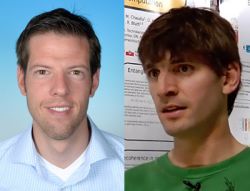
This new award has been introduced by the Institute for Quantum Optics and Quantum Information (IQOQI) to reward promising junior researcher for outstanding scientific accomplishments in the field of quantum physics. The Prize is awarded to graduates of a PhD program undertaken at the University of Innsbruck and is valued at Euro 1,000. The first recipients of this award are: Philipp Schindler (PhD) from Prof. Rainer Blatt's research group and Simon Stellmer (PhD) from Florian Schreck's research group (Schreck is a START and ERC awardee). “With this prize we would like to further motivate the students,” says Grimm, Director of the IQOQI. “Many young physicists in our groups do excellent work and they play a crucial part in our success. This new award is to show our recognition and appreciation.”
Open quantum computers and simulators
In his doctoral thesis Philipp Schindler describes the realisation of repetitive error correction in an ion-trap quantum information processor. Moreover, he shows that it is possible to undo partial measurements on a quantum register. The second part of his thesis is about the quantum simulation of a system coupled to a classical environment. He introduces an extended toolbox for an open quantum information processor, which he developed and realised experimentally with his team. This is then used to create an entangled state through dissipative dynamics. In the next step he performs a quantum simulation of a dissipative many-body system, demonstrating the hallmark feature of a novel type of quantum phase transitions. With this toolbox bigger quantum simulators could be realised to study more complex questions.
Philipp Schindler was born in Rum near Innsbruck, Austria. He majored in physics at the University of Innsbruch, where he received his PhD in 2013. He worked in Prof. Rainer Blatt's research group at the Institute for Experimental Physics at the University of Innsbruck and has just started working in Hartmut Häffner's research group at the University of California in Berkeley, USA.
Bose-Einstein condensation of strontium
Simon Stellmer's dissertation is about the experimental realisation of Bose-Einstein condensation of alkaline-earth atoms. Previously only alkali atoms had been used experimentally to produce this collective quantum state. The unique properties of the alkaline-earth atoms are at the basis of recently proposed new schemes for quantum simulation. He developed a set of experimental techniques to control the spin composition of an atomic sample and he presents deeply-degenerate Fermi gases with a variable number of spin states. Moreover, Stellmer developed a new technique of molecule association. With his research team, he realised the first Bose-Einstein condensation of strontium atoms worldwide and he was the first to create this quantum state of strontium purely by laser cooling.
Simon Stellmer was born in Hamburg, Germany and majored in physics at the local university. In 2008 he started working in Prof. Rudolf Grimm's research group at the Institute for Quantum Optics and Quantum Information. Here he worked with Florian Schreck on the realisation of a strontium Bose-Einstein condensate. After receiving a PhD in 2013 he has started working with Thorsten Schumm's research group at the Institute of Atomic and Subatomic Physics at the Technical University Vienna, Austria.